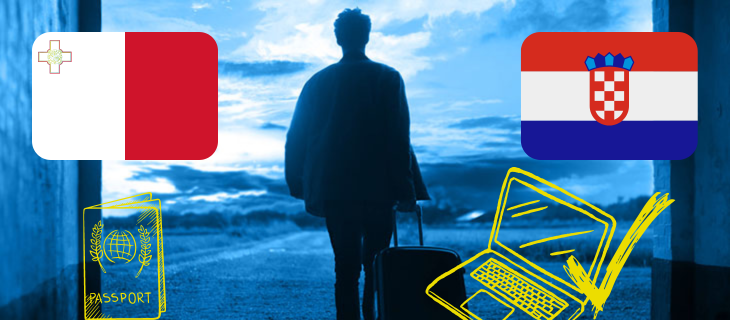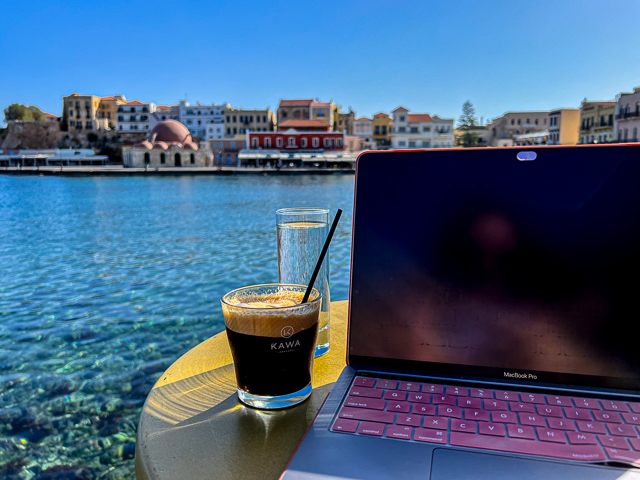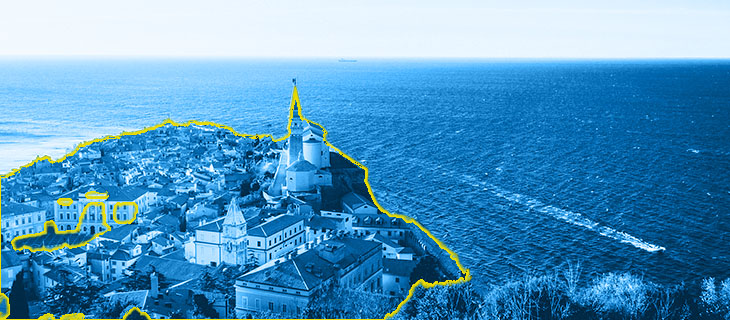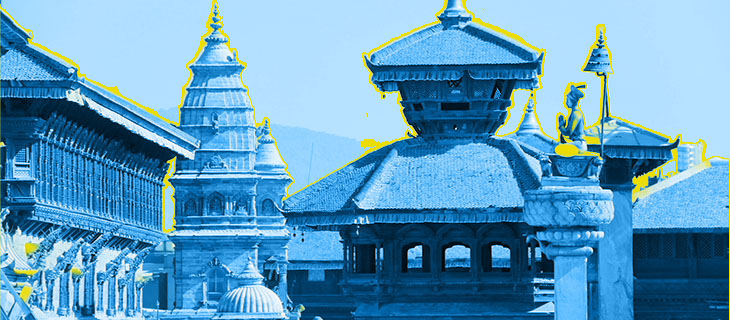Malta Digital Nomad Visa vs. Croatia Digital Nomad Visa

Finding the difference between the Malta digital nomad visa vs. Croatia digital nomad visa is crucial if you are torn between relocating to either country to work remotely.
While both of these Mediterranean countries offer excellent lifestyles for digital nomads, the rules surrounding their digital nomad visas are vastly different.
Depending on your goals and lifestyle, it’s important that you review the Malta digital nomad visa vs. Croatia digital nomad visa before deciding which one to apply for.
For example, if you wish to work remotely from one country for more than a year, the Malta digital nomad visa is the better option. But, if you wish to live tax-free in a country, then Croatia is ideal for your situation.
As you can see, there are many details that can influence your decision about which digital nomad visa to apply for. That’s exactly why Nomads Embassy has analyzed the differences of the Malta digital nomad visa vs. Croatia digital nomad visa.
By the end of this article, you will have a better idea of whether Malta or Croatia’s digital nomad visas is right for your goals and nomadic lifestyle.

What is a Digital Nomad Visa?
So, what is a digital nomad visa, and why is there so much hype around it?
There are over 30 digital nomad visas available worldwide for remote workers to relocate to a foreign country temporarily.
These visas act as temporary residence permits, allowing digital nomads to stay in a country for a year or more. Oftentimes, these visas are renewable, and some even lead to permanent residency.
It’s important to mention that these visas do not allow applicants to seek local employment. They must earn a livable income working remotely for a company or clients located abroad.
Why Choosing the Right Digital Nomad Visa is Crucial
Applying for a digital nomad visa is a big decision that shouldn’t be taken lightly.
While they do not require you to search for a job abroad, there are some serious things to consider, such as how to find an apartment to live, if you can drive in the country, and opening bank accounts if necessary.
There are also the tax implications of digital nomad visas that you must consider. Sometimes, moving to a foreign country can be detrimental to how much you owe in taxes if you don’t plan accordingly.
Choosing a digital nomad visa should be something you think deeply about and research. And well, if you’re here reading this article, you’re doing just that!
Comparing the pros and cons of each visa and imagining what life will be like for you is a crucial part of picking the right digital nomad visa to apply for.
Malta Digital Nomad Visa vs. Croatia Digital Nomad Visa by Nomads EmbassyMalta Digital Nomad Visa vs. Croatia Digital Nomad Visa
In this article, we are comparing the Malta digital nomad visa vs. Croatia digital nomad visa for an easy and straightforward way to assist you in making your decision.
Nomads Embassy: The World’s First Embassy for Digital Nomads has a mission to make the world more accessible to digital nomads by sharing verified information in an easy and comprehensive way.
Plus, with our hand-selected local immigration lawyers and our Done-for-You Digital Nomad Visa service, we’ve made the digital nomad visa application process even easier.
From research to relocation, Nomads Embassy is here to simplify the digital nomad visa process.
Visa Requirements
Each digital nomad visa has a specific set of eligibility requirements applicants must meet to be considered for approval.
Below is a comparison of Malta digital nomad visa vs. Croatia digital nomad visa requirements.
Valid Passport
- Malta – Passport must be valid at the time of applying
- Croatia – Passport must be valid for at least three months after the visa term
You must have a valid passport when applying for both Malta and Croatia digital nomad visas. However, the validity period is different.
Income Requirement
- Malta – €2,700 per month
- Croatia – €2,870 per month or €34,444 in savings
Croatia’s income requirement is less than Malta’s requirement. You can also meet the minimum income requirement for Croatia by showing that you have a certain amount in your bank account.
For Croatia, the minimum income requirement increases by 15-20% for each additional family member you include. Malta’s minimum income requirement does not increase.
Work Remotely
- Malta – Yes
- Croatia – Yes
Both countries require applicants to show proof that they work remotely through employment and/or freelance contracts or a business established abroad.
International Health Insurance
- Malta – Yes
- Croatia – Yes
Both countries require applicants to have an international health insurance policy that covers them in the country for the duration of their visa.
However, British citizens can access Malta’s healthcare for free, thanks to an agreement between the countries. Therefore, they do not require an international health insurance policy.
Clean Criminal Record
- Malta – No
- Croatia – Yes
Malta does not require applicants to submit a criminal background check when applying for a digital nomad visa.
Croatia requires a certified or apostilled criminal background check when applying.
Address of Accommodations
- Malta – Yes, after approval in principle
- Croatia – Yes, at time of applying
Both countries require applicants to have proof of accommodations in the country.
However, Malta requires your accommodations after receiving your approval in principle, allowing you to visit Malta and search for housing.
Croatia requires an address of accommodations while applying for the digital nomad visa.
Family Inclusion
- Malta – Yes
- Croatia – Yes
Malta and Croatia allow applicants to include a spouse and dependents below the age of 18.
Application Process
- Malta – Online application
- Croatia – In person at an embassy or consulate in or near the country of residence or directly in Croatia as a tourist or online
The Malta digital nomad visa application is done entirely online. There is no need to visit an embassy or consulate, and you can apply from anywhere in the world.
If your nationality requires you to apply for an entry visa to Croatia, you must apply in-person at the nearest embassy or consulate to your country of residence. You can see a list of Croatian embassies and consulates around the world here.
However, if you can enter Croatia visa-free as a tourist, then you may apply online or in the country as a tourist.
Time to Approval
- Malta – 30 days
- Croatia – three to four months
After submitting your documents to the authorities, it will take about 30 days to receive an answer from Malta.
Croatia’s processing time can take a bit longer, between three and four months, depending on where you apply.
Visa Term
- Malta – 12 months
- Croatia – 12 months
Both digital nomad visas in Malta and Croatia are valid for one year.
Renewal Options
- Malta – renewable twice
- Croatia – non-renewable
The Malta digital nomad visa is renewable twice, allowing digital nomads to live in the country for up to three years.
The Croatia digital nomad visa is non-renewable. You must leave the country for at least three months before re-entering and re-applying for the digital nomad visa.
Path to Permanent Residency
- Malta – No
- Croatia – No
Neither the Malta digital nomad visa nor the Croatia digital nomad visa will lead to permanent residency.
Government Fees
- Malta – €300
- Croatia – €174 at embassy or consulate or €96 inside Croatia
The government fees for Croatia are almost half of the amount you must pay to apply for Malta.
These fees include the visa application and residence permit fees.
Tax Implications
- Malta – Tax resident
- Croatia – Not Taxed
Malta digital nomad visa holders that spend 183 days in the country out of the year will be considered tax residents.
Croatia digital nomad visa holders do not have to pay local income tax during their stay.
Difficulty of Applying on Your Own
- Malta – 3/10
- Croatia – 7/10
While it is completely possible to apply for both the Malta and Croatia digital nomad visas on your own, it has not proven to be easy.
When dealing with embassies or consulates, you can count on long wait times on phone calls, emails, and low-tier custom service. There also tends to be a lot of miscommunication between the consulate, the government, and applicants.
Applying for a digital nomad visa with an immigration lawyer can ease this stress and miscommunication. Part of the lawyer’s job is to communicate with the embassy, consulate, and other authorities on your behalf so you don’t have to wait on hold for hours.
Having a local immigration lawyer that speaks the language can also help you get questions answered, push your application faster, and get updates on the status of your application quicker.

Begin Your Digital Nomad Visa Application with Nomads Embassy
Did this article help you decide which digital nomad visa to apply for?
After weighing the pros and cons of the Malta digital nomad visa vs. Croatia digital nomad visa, you probably have a better understanding of which is best for your lifestyle and goals.
Deciding which digital nomad visa to apply for is just the first step. Now, it’s time to connect with a local immigration lawyer to assist you with your relocation process.
Nomads Embassy is here to help connect you with our hand-selected and verified immigration lawyers worldwide.
To begin your digital nomad visa application process, request our free eligibility check today!
You may also enjoy

On November 21, 2025, the official Slovenia digital nomad visa will become available, allowing remote workers and their family members to live in the country for up to 12 months. …
by Brittany

A new digital nomad visa is on the horizon in South Asia. With a newly proposed Nepal digital nomad visa, remote workers and their family members could live in the…
by Brittany

Ever wondered how digital nomads stay connected while traveling abroad without paying an outrageous amount for an international phone plan? They get an eSIM for international travel. If you’ve ever…
by Brittany
